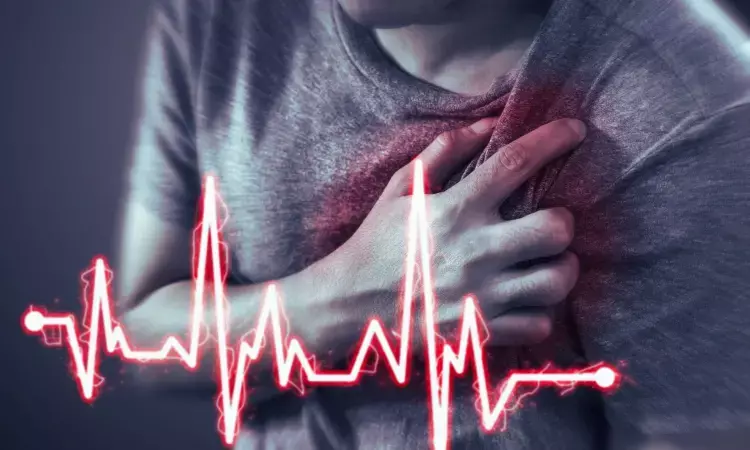- Home
- Medical news & Guidelines
- Anesthesiology
- Cardiology and CTVS
- Critical Care
- Dentistry
- Dermatology
- Diabetes and Endocrinology
- ENT
- Gastroenterology
- Medicine
- Nephrology
- Neurology
- Obstretics-Gynaecology
- Oncology
- Ophthalmology
- Orthopaedics
- Pediatrics-Neonatology
- Psychiatry
- Pulmonology
- Radiology
- Surgery
- Urology
- Laboratory Medicine
- Diet
- Nursing
- Paramedical
- Physiotherapy
- Health news
- Fact Check
- Bone Health Fact Check
- Brain Health Fact Check
- Cancer Related Fact Check
- Child Care Fact Check
- Dental and oral health fact check
- Diabetes and metabolic health fact check
- Diet and Nutrition Fact Check
- Eye and ENT Care Fact Check
- Fitness fact check
- Gut health fact check
- Heart health fact check
- Kidney health fact check
- Medical education fact check
- Men's health fact check
- Respiratory fact check
- Skin and hair care fact check
- Vaccine and Immunization fact check
- Women's health fact check
- AYUSH
- State News
- Andaman and Nicobar Islands
- Andhra Pradesh
- Arunachal Pradesh
- Assam
- Bihar
- Chandigarh
- Chattisgarh
- Dadra and Nagar Haveli
- Daman and Diu
- Delhi
- Goa
- Gujarat
- Haryana
- Himachal Pradesh
- Jammu & Kashmir
- Jharkhand
- Karnataka
- Kerala
- Ladakh
- Lakshadweep
- Madhya Pradesh
- Maharashtra
- Manipur
- Meghalaya
- Mizoram
- Nagaland
- Odisha
- Puducherry
- Punjab
- Rajasthan
- Sikkim
- Tamil Nadu
- Telangana
- Tripura
- Uttar Pradesh
- Uttrakhand
- West Bengal
- Medical Education
- Industry
Can prehospital high-dose glucocorticoids impact hemodynamics in patients resuscitated from out-of-hospital cardiac arrest?

Recently published study is a sub-study of the STEROHCA trial and focuses on assessing the hemodynamic effects of prehospital high-dose glucocorticoid treatment in resuscitated comatose out-of-hospital cardiac arrest (OHCA) patients. The aim was to evaluate the association between inflammatory markers, hemodynamic instability, organ dysfunction, and the need for vasopressor support. The study included patients who remained comatose at admission and survived until intensive care unit (ICU) admission. The primary outcome was the cumulated norepinephrine use from ICU admission until 48 h reported as mcg/kg/min.
The STEROHCA trial was a phase 2 randomised study that compared the effects of a single prehospital injection of methylprednisolone 250 mg with a placebo given shortly after resuscitated out-of-hospital cardiac arrest. This sub-study included patients who were unconscious at arrival and survived until they were admitted to the intensive care unit (ICU). The main result was the total amount of norepinephrine used from ICU admission to 48 hours, recorded in mcg/kg/min. Secondary outcomes were assessing hemodynamic state using mean arterial pressure (MAP), heart rate, vasoactive-inotropic score (VIS), and the VIS/MAP-ratio, as well as evaluating cardiac function by pulmonary artery catheter measures. Linear mixed-model analyses were used to assess the mean differences between treatment groups at all follow-up dates.
Results of Glucocorticoid Treatment
The results of the study indicated that prehospital treatment with high-dose glucocorticoid was associated with reduced norepinephrine use in resuscitated OHCA patients. Specifically, from the time of ICU admission up to 48 h post-admission, patients in the glucocorticoid group cumulated a lower norepinephrine use. Additionally, the glucocorticoid group showed a higher mean arterial pressure (MAP) after 12–24 h post-admission, with no major differences in heart rate. The differences between the treatment groups were also present 30–48 h post-admission but to a smaller extent. No differences were found in pulmonary artery catheter measurements between groups.
Implications and Future Research
The findings suggest that glucocorticoid treatment in the prehospital setting may lead to reduced norepinephrine use and improved hemodynamic stability in resuscitated OHCA patients. However, further research is needed to determine the long-term effects and clinical outcomes of high-dose glucocorticoid treatment in this patient population. This study provides valuable insights into the potential impacts of glucocorticoid treatment on hemodynamics in resuscitated OHCA patients.
Reference -
Obling, L.E.R., Beske, R.P., Meyer, M.A.S. et al. Effect of prehospital high-dose glucocorticoid on hemodynamics in patients resuscitated from out-of-hospital cardiac arrest: a sub-study of the STEROHCA trial. Crit Care 28, 28 (2024). https://doi.org/10.1186/s13054-024-04808-3.
MBBS, MD (Anaesthesiology), FNB (Cardiac Anaesthesiology)
Dr Monish Raut is a practicing Cardiac Anesthesiologist. He completed his MBBS at Government Medical College, Nagpur, and pursued his MD in Anesthesiology at BJ Medical College, Pune. Further specializing in Cardiac Anesthesiology, Dr Raut earned his FNB in Cardiac Anesthesiology from Sir Ganga Ram Hospital, Delhi.
Dr Kamal Kant Kohli-MBBS, DTCD- a chest specialist with more than 30 years of practice and a flair for writing clinical articles, Dr Kamal Kant Kohli joined Medical Dialogues as a Chief Editor of Medical News. Besides writing articles, as an editor, he proofreads and verifies all the medical content published on Medical Dialogues including those coming from journals, studies,medical conferences,guidelines etc. Email: drkohli@medicaldialogues.in. Contact no. 011-43720751


